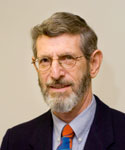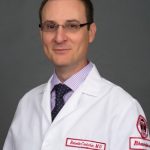 Richard Panush, MD, has been a leader and respected voice in rheumatology for six decades, serving on numerous boards and committees, editing journals and writing thought-provoking columns for The Rheumatologist. In 2010, he accepted an appointment as professor of medicine at the Keck School of Medicine at the University of Southern California in Los Angeles.
Richard Panush, MD, has been a leader and respected voice in rheumatology for six decades, serving on numerous boards and committees, editing journals and writing thought-provoking columns for The Rheumatologist. In 2010, he accepted an appointment as professor of medicine at the Keck School of Medicine at the University of Southern California in Los Angeles.
The Rheumatologist recently asked for his opinions on a few hot topics:
Question: How does the field convince more trainees, medical students and medical residents to pursue careers in rheumatology?
Answer: We need to model [the career] better. Nothing will be a more powerful inducement to others to consider careers in rheumatology than seeing us changing patients’ lives; observing us finding fun and fulfillment in doing rheumatology, be it investigative, clinical, educational or some combination of these; watching us engaged by the clinical and intellectual challenges of our discipline. [Individuals will] recognize that we exemplify the ‘compleat’ physician and live Francis Peabody’s dictum that ‘the secret of the care of the patient is in caring for the patient;’1 or notice how we rheumatologists disproportionately assume leadership roles in all aspects of medicine, ranging from laboratory science to patient care to pedagogy to educational administration to industry to outcomes research to reducing disparities of care.
In this context, I reprise some of my comments on today’s reality that the majority of our trainees are now international medical graduates: ‘We should see increasing numbers of [foreign medical graduates] as fellows and future colleagues (until or unless graduate medical education in this country is transformed), and we should certainly welcome them as colleagues. After all, we’re all just people—or, in our case, rheumatologists.’2
It is dangerous, indeed, to think otherwise.
Q: You’ve written about your concerns regarding medical training, specifically the Accreditation Council for Graduate Medical Education’s (ACGME) Next Accreditation System (NAS). Do you remain concerned, or has your outlook changed in recent years?
A: I’m disappointed with the NAS, the ‘next’ or ‘new’—now really the current—accreditation system for rheumatology training. I expressed my concerns at some length in an August 2013 article in The Rheumatologist.3
We can never be complacent, neither about our education and training, nor about any aspects of our art and science. It’s salutary to reflect on what we do and to try to improve. But neither should we reject past or present practices without reasoned review and clear evidence of inadequacy—and certainly not simply for a newer fashion or unproven hypothesis.
I have great respect for ACGME leadership, some of whom I have known and worked with for many years, and their admirably noble conception of a superb GME [graduate medical education] system responsive to perceived public and regulatory expectations. I am concerned that we have embarked on a new approach to GME [that is] competency based; however appealing, [this] has not yet been shown to be better than what we have been doing, and [its] implementation has not been fully studied. I am not convinced that our product has necessarily been faulty. And we must now change at enormous cost, both in dollars and effort.
It’s been said that the time to fix something is before it becomes broken, not after. But I just don’t countenance the pervasive alterations purveyed. We have seen other similar expensive and extensive innovations recently imposed on us, [whose] anticipated value has not been realized—work hours, the EMR, the patient-centered medical home and maintenance of certification, for example. I am concerned that this may be that.
Q: You’ve written about how much you enjoy literature, including poetry. Are you at all concerned that technology is eroding our attention spans and, hence, making our society (and trainees) less apt to read, study and think critically?
A: I think the transformations in society and in medical education as a consequence of technologic advances challenge us to continue to teach our core messages and values about medicine to new generations in novel ways. It’s not easy for me as an aging rheumatologist, but there are extraordinary opportunities here. I am tremendously impressed with today’s medical students and residents: They are bright, curious, worldly, socially aware and deeply committed to [doing] good. We should be proud of them and embrace our roles in preparing them to follow us.
I recall coming across something by David Rogers, a giant in academic medicine, about changes in the landscape of medical education and training some years ago, about which he said, ‘History suggests that societies, when faced with trends that look as though they will create negative human consequences, often opt for changes of a more socially responsible nature to avoid such outcomes. Thus, people often make adjustments in trends that futurologists find quite impossible to predict … [Predictions] do not take into account the creativity of basic decency of human beings.’
Medicine and rheumatology will be just fine—if not better.
Q: What has you most concerned about healthcare?
A: Inequities—making advances in care and state-of-the-art care equally and widely accessible and available. Perpetuating inequities is pernicious. It is unjust, unwise, and ultimately more expensive, does not maximize human and societal potential, and is simply morally wrong.
Q: Where do you see rheumatology 10 years from now?
A: I’m not sure which to predict will come first, the cure for fibromyalgia or for systemic sclerosis.
Change is discontinuous, it has been said. So I wish I could envision something unanticipated, equivalent—say—to what H. pylori was to the pathogenesis of ulcer disease. Maybe the cure for lupus will be in samplings from Mars or elsewhere in space, maybe vaccination to [the] Zika virus will confer resistance or immunity to [rheumatoid arthritis], or maybe McDonald’s fries will protect against autoimmune disease.4
More likely, the not-too-distant future should, indeed, bring us better understandings of rheumatic diseases from which will come better and personalized care, including remissions, cures, vaccines and other preventive measures. What we learn about rheumatic diseases will overlap with progress in cancer, aging, dementia and other chronic inflammatory and immunologically mediated disorders.
I would hope to see us thinking more about promoting and preserving health than managing disease. I would like to hope, too, that we will have identified newer and better ways of providing adequate care to all. And we will see these trends evolve through more and better international collaborations. Long gone are the days when rheumatology was largely an American enterprise.
And most of all, I hope I’m around to see what does transpire.
Richard Quinn is a freelance writer in New Jersey.
References
- Hurst JW. Francis W. Peabody, we need you. Tex Heart Inst J. 2011; 38(4):327–329.
- Panush RS. Rheum with a view. The Rheumatologist. 2011 Jan 17.
- Panush RS. Rheum with a view: How should we train rheumatology fellows? The Rheumatologist. 2011 Jan 17.
- Hernandez AL, Kitz A, Wu C, et al. Sodium chloride inhibits the suppressive function of FOXP3+ regulatory T cells. J Clin Invest. 2015 Nov 2;125(11):4212–4222. doi: 10.1172/JCI81151. Epub 2015 Oct 20.


